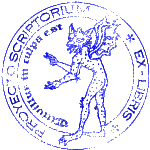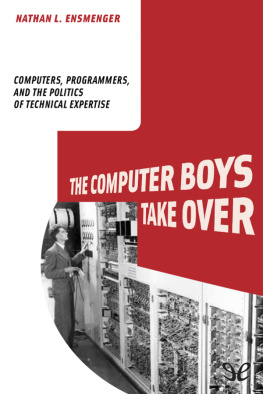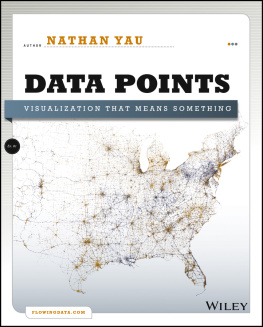Nathan L. Ensmenger - The Computer Boys Take Over
Here you can read online Nathan L. Ensmenger - The Computer Boys Take Over full text of the book (entire story) in english for free. Download pdf and epub, get meaning, cover and reviews about this ebook. year: 2010, publisher: ePubLibre, genre: Politics. Description of the work, (preface) as well as reviews are available. Best literature library LitArk.com created for fans of good reading and offers a wide selection of genres:
Romance novel
Science fiction
Adventure
Detective
Science
History
Home and family
Prose
Art
Politics
Computer
Non-fiction
Religion
Business
Children
Humor
Choose a favorite category and find really read worthwhile books. Enjoy immersion in the world of imagination, feel the emotions of the characters or learn something new for yourself, make an fascinating discovery.
- Book:The Computer Boys Take Over
- Author:
- Publisher:ePubLibre
- Genre:
- Year:2010
- Rating:3 / 5
- Favourites:Add to favourites
- Your mark:
- 60
- 1
- 2
- 3
- 4
- 5
The Computer Boys Take Over: summary, description and annotation
We offer to read an annotation, description, summary or preface (depends on what the author of the book "The Computer Boys Take Over" wrote himself). If you haven't found the necessary information about the book — write in the comments, we will try to find it.
The Computer Boys Take Over — read online for free the complete book (whole text) full work
Below is the text of the book, divided by pages. System saving the place of the last page read, allows you to conveniently read the book "The Computer Boys Take Over" online for free, without having to search again every time where you left off. Put a bookmark, and you can go to the page where you finished reading at any time.
Font size:
Interval:
Bookmark:

This is a book about the computer revolution of the mid-20th century and the people who made it possible. Unlike most histories of computing, it is not a book about machines, inventors, or entrepreneurs. Instead, it tells the story of the vast but largely anonymous legions of computer specialistsprogrammers, systems analysts, and other software developerswho transformed the electronic computer from a scientific curiosity into the defining technology of the modern era. Known alternatively as "whiz kids," "hackers," and "gurus," this new breed of technical specialists were alternately admired for their technical prowess and despised for their eccentric mannerisms and the disruptive potential of the technologies they developed. As the systems that they built became evermore powerful and ubiquitous, these specialists became the focus of a series of critiques of the social and organizational impact of electronic computing. To many of their contemporaries, it seemed the "computer boys" were taking over, not just in the corporate setting, but also in government, politics, and society in general.
In The Computer Boys Take Over, Nathan Ensmenger traces the rise to power of the computer expert in modern American society. He follows the history of computer programming from its origins as low-status, largely feminized labor in the secret wartime computing projects through its reinvention as a glamorous "black art" practiced by "computer cowboys" in the 1950s through its rationalization in the 1960s as the academic discipline of computer science and the software engineering profession. His rich and nuanced portrayal of the men and women (a surprising number of the "computer boys" were, in fact, female) who built their careers around the novel technology of electronic computing explores issues of power, identity, and expertise that have only become more significant to our increasingly computerized society. His detailed analysis of the pervasive "software crisis" rhetoric of the late 1960s shows how seemingly technical debates about how to manage large-scale software development projects reflected deeper concerns about the growing power and influence of technical specialists in corporate, academic, and governmental organizations.
In his recasting of the drama of the computer revolution through the eyes of its principle revolutionaries, Ensmenger reminds us that the computerization of modern society was not an inevitable process driven by impersonal technological or economic imperatives, but was rather a creative, contentious, and above all, fundamentally human development.

Nathan L. Ensmenger
Computers, Programmers, and the Politics of Technical Expertise
History of Computing - 20
ePub r1.1
fauri13 07.10.14
Original Title: The Computer Boys Take Over
Nathan L. Ensmenger, 2010
Digital Editor: fauri13
ePub base r1.1

For Deborah and the boys

NATHAN L. ENSMENGER studied engineering and operations research at Princeton University, where he focused on the development of expert systems. He worked for many years in the software industry for clients that include Deloitte & Touche, Ernst & Young, Bank of America, and the National Association of Manufacturers. Shortly after obtaining his PhD in the history of science from the University of Pennsylvania, he was appointed to the faculty. In addition to holding his faculty position at Penn for almost a decade, he has taught at the School of Information at the University of TexasAustin, and as of 2012, the School of Information and Computing at Indiana University.
His research agenda currently focuses on the social and cultural history of software and software workers, the history of artificial intelligence, and the organizational dynamics of information technology. His book, The Computer Boys Take Over: Computers, Programmers, and the Politics of Technical Expertise, explores the rise to power of a new group of technical experts in the American corporation. He is one of the co-authors of the third edition of the popular Computer: A History of the Information Machine. He is currently working on a book on the environmental history of computing.
Professor Ensmenger is an associate editor of the IEEE Annals of the History of Computing and serves on the editorial board of the journal Information & Culture. He was a Mellon Fellow in the Humanities at the University of Pennsylvania, and is currently a fellow at the Rob Kling Center for Social Informatics.
For more information, see his curriculum vitae.
[1] Bureau of Labor Statistics, U.S. Department of Labor, Occupational Outlook Handbook, 200809 edition; Aid to recovery: the economic impact of IT, software, and the Microsoft ecosystem on the global economy. Springfield, MA: Interactive Data Corporation, 2009.
[2] Stuart Shapiro and Steven Woolgar. Balancing acts: reconciling competing visions of the way software technologists work, in Proceedings of the Eighth IEEE International Workshop on Incorporating Computer Aided Software Engineering (Los Alamitos, CA: IEEE Computer Society Press, 1997): 364370; Stephen Barley and Gideon Kunda, Gurus, Hired Guns, and Warm Bodies: Itinerant Experts in a Knowlege Economy (Princeton, NJ: Princeton University Press, 2004).
[3] Jackson Granholm, How to Hire a Programmer, Datamation 8, no. 8 (1962): 3132; Sherry Turkle, The Second Self: Computers and the Human Spirit (New York: Simon and Schuster, 1984); Ron Eglash, Race, Sex, and Nerds: From Black Geeks to Asian American Hipsters, Social Text 2, no. 20 (2002): 4964; Steve Lohr, Go To: The Story of the Math Majors, Bridge Players, Engineers, Chess Wizards, Maverick Scientists, and IconoclastsThe Programmers Who Created the Software Revolution (New York: Basic Books, 2001).
[4] Deborah Lupton, The Embodied Computer User, Body and Society 1, no. 34 (1995): 97112; Fergus Murray and David Knights, Inter-managerial Competition and Capital Accumulation: IT Specialists, Accountants, and Executive Control, Critical Perspectives on Accounting 1, no. 2 (June 1990): 167189.
[5] Steve Silberman, The Geek Syndrome, Wired 9, no. 12 (2001): 175183; Majia Holmer Nadesan, Constructing Autism: Unravelling the Truth and Understanding the Social (London: Routledge, 2005), 199.
[6] David Anderegg, Nerds: Who They Are and Why We Need More of Them (New York: Jeremy P. Tarcher, 2007); Benjamin Nugent, American Nerd: The Story of My People (New York: Scribner, 2008).
[7] Joseph Weizenbaum, Computer Power and Human Reason: From Judgment to Calculation (New York: Penguin, 1976); Steven Levy, Hackers: Heroes of the Computer Revolution (Garden City, NY: Anchor Press, 1984); Katie Hafner, CYBERPUNK: Outlaws and Hackers on the Computer Frontier, Revised (New York: Simon and Schuster, 1995).
[8] Philip Scranton, None-too-Porous Boundaries: Labor History and the History of Technology, Technology and Culture 29, no. 744778 (1988); Stephen Barley, Technicians in the Workplace: Ethnographic Evidence for Bringing Work into Organization Studies,
Font size:
Interval:
Bookmark:
Similar books «The Computer Boys Take Over»
Look at similar books to The Computer Boys Take Over. We have selected literature similar in name and meaning in the hope of providing readers with more options to find new, interesting, not yet read works.
Discussion, reviews of the book The Computer Boys Take Over and just readers' own opinions. Leave your comments, write what you think about the work, its meaning or the main characters. Specify what exactly you liked and what you didn't like, and why you think so.













